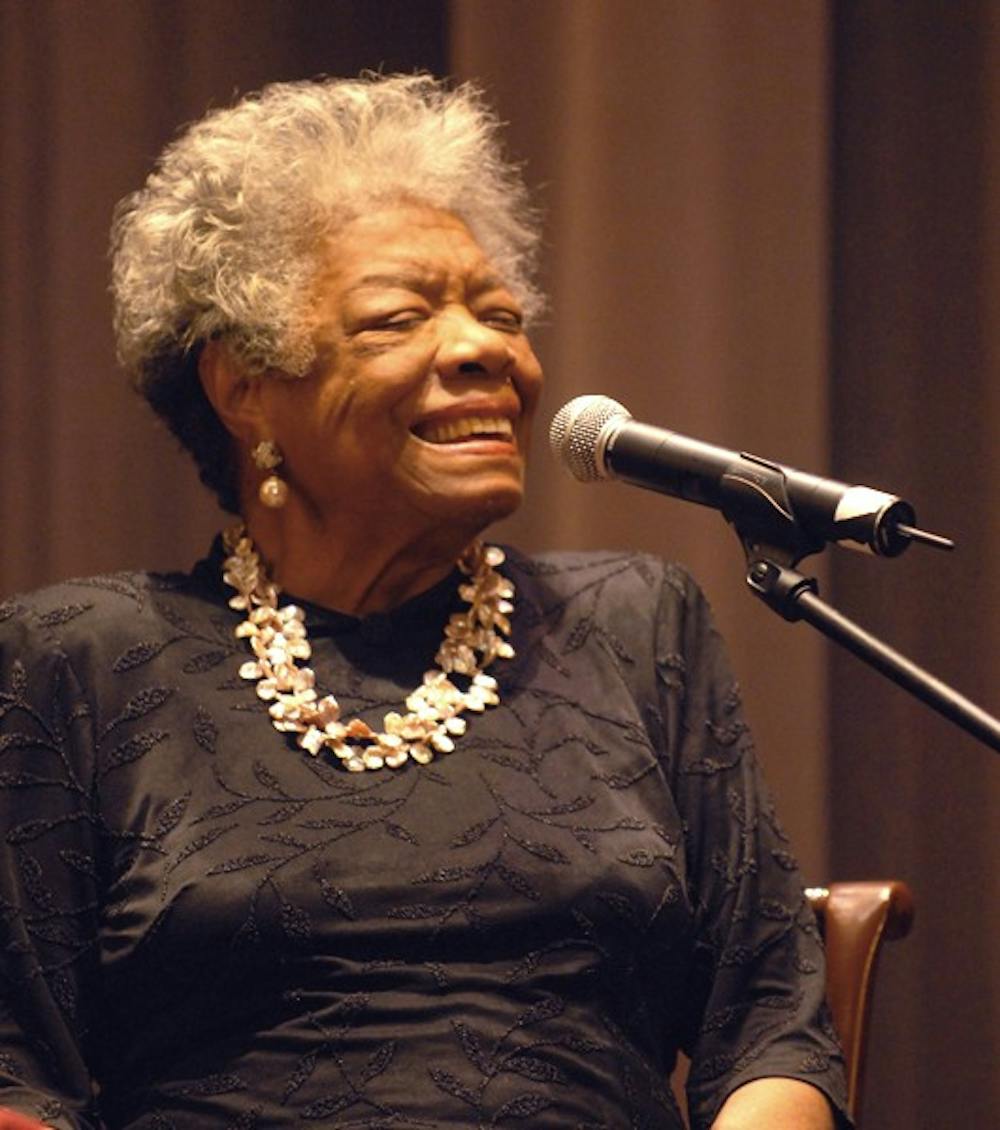Renowned poet and author Maya Angelou passed away Wednesday at the age of 86 in her home in Winston-Salem, North Carolina, but her legacy lives on at Penn in more than her writing.
“We think of her first as a poet and autobiographer, but she was a singer, a film-maker, a life-long activist for civil rights, a global citizen, a mother, a dancer and always a woman of phenomenal dignity,” said Penn assistant professor of English Tsitsi Jaji.
Angelou spoke at the University twice to sold-out audiences in Irvine Auditorium, first in a Social Planning and Events Committee event in 2002 and then as the Women’s Week keynote speaker in 2009. During both visits, she approached somber topics with a lighthearted attitude, incorporating both song and speech into her presentations. Drawing upon her own personal struggles with sexual abuse and racial inequality, Angelou shared her perspectives on education and offered valuable life lessons for the audience.
"I am serious, so I laugh a lot," Angelou said when she spoke at Penn in 2002. "You need to laugh. You don't laugh enough. I don't trust anyone who doesn't laugh."
Associate Director for Recruitment at the Center for Programs in Contemporary Writing and 2005 College graduate Jamie-Lee Josselyn saw Angelou speak in 2005.
"Irvine Auditorium never felt smaller — she filled it with her big voice, both speaking and singing, and with her great sense of hope, intelligence and compassion," Josselyn said. "I was sitting in the balcony, in awe."
Amanda Von Scoyoc, a 2005 College graduate, echoed those sentiments.
"In this big space, the entire time she talked, it kind of felt like she was just whispering to me," Von Scoyoc said. "When she died, she just brought me back to that feeling."
Throughout her life, Angelou stood out as a prominent activist for minority rights, using her literary passions as a vehicle for change.
"Blacks are still the last hired and the first fired," Angelou said during her Women’s Week keynote speech in 2009. "How did these people survive? I suggest poetry."
Graduate and Undergraduate Chair of the Department of Africana Studies Herman Beavers recalls reading Angelou's work for the first time at age 16.
"It was like walking into a dark room and flipping the light switch; she made clear so many of the things I felt growing up in such an unsettled moment in American history," Beavers said. "The best way to sum up her legacy is that she found so many different ways to tell the truth."
In the fall of 2000, the University considered inviting Angelou to speak at the Commencement ceremony, drawing strong student support. The Daily Pennsylvanian published editorials by three separate guest columnists, advocating for Angelou’s selection. Ultimately, Senator John McCain was chosen as that year’s speaker.
Jaji recalls teaching a poetry course over the Spring semester in which students were invited to recite their favorite poems.
“One student recited Ms. Angelou’s ‘Phenomenal Woman,’” Jaji said. “In a time when few people memorize poetry, I think the fact that students carry Ms. Angelou’s words around in their heads speaks volumes.”
Best-known for her 1969 autobiography, “I Know Why the Caged Bird Sings,” Angelou received many distinctions, including the Presidential Medal of Freedom in 2011, the highest civilian honor in the country. While she never earned a college degree, Angelou was awarded over 30 honorary doctorate degrees from such institutions as Columbia University and Boston College.
“It's impossible to sum up her significance, because she was influential in so many spheres, and her life was entwined with many who shaped the twentieth century and beyond,” Jaji said.
Angelou leaves the world with a legacy of courage and perseverance.
“You may not control all the events that happen to you,” she wrote in a book of essays entitled Letter to my Daughter. “But you can decide not to be reduced by them."
Although 12 years have passed since Von Scoyoc listened to Angelou speak at Penn, she continues to carry Angelou's words with her.
"It was a talk I wasn't really prepared to be so affected by. And it was clear that when I was there, that this was something powerful, this was something great," Von Scoyac said. "This was someone who understood things in the way that I wanted to understand things."
Related: Faculty, alums and students remember Maya Angelou on Twitter



